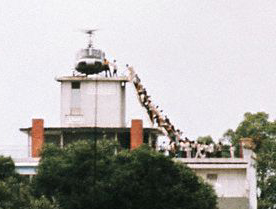Difference between revisions of "Vietnam War"
(what about 1812? what about korea?) |
m (Reverted edits by GodlessLiberal (Talk); changed back to last version by Dave3172) |
||
| Line 2: | Line 2: | ||
The '''Vietnam War''', officially the '''Second Indochina Conflict''', was initiated by the [[United States]], in response to a poll conducted that suggested given the planned democratic election after the reduction of the demilitarized zone upheld until [[1956]] since the war would lead to a certain [[communist]] victory. | The '''Vietnam War''', officially the '''Second Indochina Conflict''', was initiated by the [[United States]], in response to a poll conducted that suggested given the planned democratic election after the reduction of the demilitarized zone upheld until [[1956]] since the war would lead to a certain [[communist]] victory. | ||
| − | America, knowing that South Vietnam would democratically become a communist state abstained from signing the Geneva conference of 1954 allowing this election to happen even though these were the grounds they had stated at the end of the [[Second World War]]. A frustrated [[Ho Chi Minh]] eventually decided to move into South Vietnam as the increasingly unpopular US controlled government employed stronger tactics to maintain the South Vietnamese people under Diem. In retaliation the US sent 'advisers' to help Diem keep the situation under control before stepping up to a full scale ground war. The war was the longest in American history, lasting approximately 16 years. | + | America, knowing that South Vietnam would democratically become a communist state abstained from signing the Geneva conference of 1954 allowing this election to happen even though these were the grounds they had stated at the end of the [[Second World War]]. A frustrated [[Ho Chi Minh]] eventually decided to move into South Vietnam as the increasingly unpopular US controlled government employed stronger tactics to maintain the South Vietnamese people under Diem. In retaliation the US sent 'advisers' to help Diem keep the situation under control before stepping up to a full scale ground war. The war was the longest in American history, lasting approximately 16 years. It was also the first war fought by America in which the stated military goals of the Americans were not met and it is now widely agreed that it is the first war America actually lost failing to win the hearts and minds of both the Vietnamese and the people back home. |
==Opposition to the Vietnam War== | ==Opposition to the Vietnam War== | ||
Revision as of 23:38, May 4, 2007

The Vietnam War, officially the Second Indochina Conflict, was initiated by the United States, in response to a poll conducted that suggested given the planned democratic election after the reduction of the demilitarized zone upheld until 1956 since the war would lead to a certain communist victory.
America, knowing that South Vietnam would democratically become a communist state abstained from signing the Geneva conference of 1954 allowing this election to happen even though these were the grounds they had stated at the end of the Second World War. A frustrated Ho Chi Minh eventually decided to move into South Vietnam as the increasingly unpopular US controlled government employed stronger tactics to maintain the South Vietnamese people under Diem. In retaliation the US sent 'advisers' to help Diem keep the situation under control before stepping up to a full scale ground war. The war was the longest in American history, lasting approximately 16 years. It was also the first war fought by America in which the stated military goals of the Americans were not met and it is now widely agreed that it is the first war America actually lost failing to win the hearts and minds of both the Vietnamese and the people back home.
Opposition to the Vietnam War
The Vietnam War is remembered as creating massive opposition in the United States. Much of the hippie movement was based in opposition to the Vietnam War and a belief in pacifism more broadly. This opposition inspired such songs as "The I Feel Like I'm Fixing to Die Rag," by Country Joe McDonald, "Give Peace a Chance," by John Lennon, "Run Through the Jungle," by Creedence Clearwater Revival, and "War," by Edwin Starr. This opposition also manifested itself in the form of protests. One of the most famous protests of this era occurred at Kent State University in Ohio, during which four students were shot and killed by the Ohio State National Guard following several days of rioting and the firebombing of the ROTC building. The shooting was later determined to be justified when a federal court dismissed the case against the eight guardsmen indicted.[1]
It wasn't until the Reagan era that popular culture, and society, began to embrace Vietnam veterans as heroes by creating characters like John Rambo and John "Hannibal" Smith.
External links
- Larry Berman, Perfect Spy: The Incredible Double Life of Pham Xuan An, Time Magazine (Smithsonian Books/HarperCollins, 2007). [2]
- SIGINT and the Fall of Saigon, April 1975.